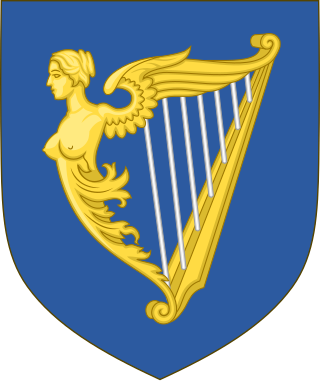Top Qs
Timeline
Chat
Perspective
Irish House of Commons
Lower house of the Parliament of Ireland that existed from 1297 until 1800 From Wikipedia, the free encyclopedia
Remove ads
The Irish House of Commons (Irish: Teach na gComóntach, Teach na dTeachtaí) was the lower house of the Parliament of Ireland that existed from 1297 until the end of 1800. The upper house was the House of Lords. The membership of the House of Commons was directly elected, but on a highly restrictive franchise, similar to the unreformed House of Commons in contemporary Great Britain. Catholics were disqualified from sitting in the Irish parliament from 1691, even though they comprised the vast majority of the Irish population.
The Irish executive, known as the Dublin Castle administration, under the Lord Lieutenant of Ireland, was not answerable to the House of Commons but to the British government. However, the Chief Secretary for Ireland was usually a member of the Irish parliament. In the Commons, business was presided over by the Speaker.
From 1 January 1801, it ceased to exist and was succeeded by the House of Commons of the United Kingdom.
Remove ads
Franchise
The limited franchise was exclusively male; from 1728 until 1793, Catholics were disfranchised, as well as being ineligible to sit in the Commons. Most of the population of all religions had no vote. In counties, forty-shilling freeholders were enfranchised while in most boroughs it was either only the members of self-electing corporations or a highly restricted body of freemen that were eligible to vote for the borough's representatives. The vast majority of parliamentary boroughs were pocket boroughs, the private property of an aristocratic patron.
Remove ads
Abolition
The House of Commons was abolished under the Acts of Union 1800, which merged the Kingdom of Ireland into the Kingdom of Great Britain to form the United Kingdom of Great Britain and Ireland with effect from 1 January 1801. The Irish House of Commons sat for the last time in Parliament House, Dublin on 2 August 1800. One hundred of its members were designated or co-opted to sit with the House of Commons of Great Britain, forming the House of Commons of the United Kingdom. The patron of pocket boroughs that were disfranchised under the Act of Union was awarded £15,000 compensation for each.[1]
Remove ads
Speaker of the Commons

The Speaker of the Irish House of Commons was the presiding officer of the House and its most senior official. The position was one of considerable power and prestige, and in the absence of a government chosen from and answerable to the Commons, he was the dominant political figure in the Parliament. The last Speaker was John Foster.
Constituencies
Summarize
Perspective

The number of boroughs invited to return members had originally been small (only 55 Boroughs existed in 1603) but was doubled by the Stuart monarchs. By the time of the Union, there were 150 constituencies, each electing two members by plurality block voting; an elector could vote for one or two of the candidates, with the two receiving most votes being returned. The constituencies had different franchises as follows: [2]
- 32 county constituencies;
- 8 county borough constituencies;
- 109 borough constituencies, of varying franchises:
- 1 university constituency (Dublin University).
Following the Act of Union, from 1801, there were 100 MPs from Ireland in the House of Commons of the United Kingdom. The Irish constituencies at Westminster were a subset of those in the Irish House of Commons as follows:
- the 32 counties and two most populous county borough constituencies, Cork City and Dublin City, retained two MPs each;
- the 6 other county boroughs, the university, and the 25 most populous boroughs were reduced to one MP each;
- the 84 least populous Irish parliamentary boroughs were disfranchised after the Union.




Remove ads
Means of resignation
Until 1793 members could not resign their seats. They could cease to be a member of the House in one of four ways:
- death,
- expulsion,
- taking Holy Orders, or
- being awarded a peerage and so a seat in the Irish House of Lords.
- Standing down at election to the House.
In 1793 a means for resignation was created, equivalent to the Crown Steward and Bailiff of the Chiltern Hundreds or the Manor of Northstead as a means of resignation from the British House of Commons. From that date, Irish members could be appointed to the Escheatorship of Munster, the Escheatorship of Leinster, the Escheatorship of Connaught or the Escheatorship of Ulster. Possession of one of these Crown offices, "office of profit under the Crown" with a 30-shilling salary, terminated one's membership of the House of Commons.
Remove ads
Notable members
- Henry Grattan: leader of the Irish Patriot Party.
- Boyle Roche: The "father" of Irish bulls
- Hon. Arthur Wellesley: Later became Duke of Wellington, defeated Napoleon at Waterloo, and served as Prime Minister of the United Kingdom. He represented his family borough of Trim from 1790 to 1798.
- William Conolly: Speaker from 1715 to 1729. Conolly was notable not just for his role in parliament but also for his great wealth that allowed him to build one of Ireland's greatest Georgian houses, Castletown House.
- Nathaniel Clements: 1705–77 Government and Treasury Official, Managed extensive financial functions from 1720 to 1777[dubious – discuss] on behalf of the government, de facto minister for finance 1740–77, extensive property owner and developer. A major influence on the architecture of Georgian Dublin and the Irish Palladian country house.
- John Philpot Curran: Orator and wit, originator of the phrase "Eternal vigilance is the price of liberty".
Remove ads
See also
References
Sources
External links
Wikiwand - on
Seamless Wikipedia browsing. On steroids.
Remove ads


